AudioCulture
The noisy library of New Zealand music
Te pātaka korihi o ngā puoro o Aotearoa
Aaradhna
aka Aaradhna Patel
During the first major arc of her professional recording and performance career, Aaradhna played a central role in the first rise and second coming of South Auckland’s storied Dawn Raid Entertainment hip-hop/R&B record label. This run culminated in an electrifying moment when she spoke truth to power at the 2016 Vodafone New Zealand Music Awards before pulling the pin and rebooting herself as an independent artist.
In 2017, Aaradhna received a Grammy nomination for Best Reggae Album for her songwriting on American-Samoan singer J Boog’s Wash House Ting album. She spent the next seven years playing live across New Zealand, Australia, and Southeast Asia, living life, writing, recording, and producing her fifth album, Sweet Surrender (2024). At home, her talent and accomplishments have firmly etched her name in our local history books. Through her last two albums, Brown Girl (2016) and Sweet Surrender (2024) and her work with J Boog, she continues to move ever closer to doing the same within the annals of popular music worldwide.
Early Days
Born in December 1983, Aaradhna Jayantilal Patel grew up in a culturally rich household in Porirua, near Wellington. Raised by a Samoan mother and an Indian father who both loved to sing and write music, her childhood was soundtracked by traditional Indian folkloric music and American gospel and soul records. However, something shifted when she was exposed to the game-changing sounds of mainstream US R&B in the early 90s.
“That’s how I wrote my music, on an answering machine.”
At age 11, she wrote her first song, an R&B ballad titled ‘Do You Love Me or Do You Love Her’. Two years later, she entered her first local talent quest and formed a short-lived five-piece girl group, Lovera. Aaradhna remembers jamming with the girls during school lunchtimes or skipping classes to write and sing together before entering the Smokefree Pacifica Beats music competition.
Throughout her teens, Aaradhna worked hard at using what she had to develop her songcraft. Instead of accompanying herself with guitar or piano, her process revolved around beatboxing (a vocal percussion style) and layering recordings of her voice using three-way calling and the answering machine on her family’s home phone line. It was an act of No.8 wire ingenuity that allowed her to establish a rhythm, record a lead vocal on top and add harmonies afterwards. She told Sunday magazine in 2015, “That’s how I wrote my music, on an answering machine ... If you have nothing, you have to make do with whatever you’ve got ... Shot, Telecom!”
Dawn Raid
As she became more serious about singing, Aaradhna replaced the answerphone/three-way combo with a tape recorder and the family stereo. She began sending cassette tape demos and handwritten letters to local record labels.
In December 2024, I visited Aaradhna at her inner-city studio space in Wellington. After an hour-long interview, she showed me several beautifully hiss-drenched recordings from that era. However, that conversation came with a proviso. “Sometimes, I feel like I’m not telling my story right because I’m missing a lot of details,” she admitted. “I can get really frustrated in interviews because I’m not always able to express myself. That’s why I let my music do the talking. It will always resonate with the right people.”
Although her cassette tape demos didn’t lead anywhere back then, a chance encounter gave her what she needed. In the early 2000s, Dawn Raid co-founder Brotha D stopped off at her grandmother’s house to get his hair braided while visiting Wellington for a show. “My auntie called me to go to Grandma’s house,” she told Back2Basics in 2006. “I was put on the spot to sing to Brotha D.”
Brotha D was blown away. He flew Aaradhna to Auckland to record with Nainz and Viiz Tupai, the two Samoan brothers who were then on the verge of becoming famous as Adeaze. Aaradhna knows how lucky she was early in her career.
“This entertainment business is a gamble,” she says, sitting in her studio chair surrounded by keyboard racks, computer screens, and photos of the famous Black American singers who have inspired her. “Having that opportunity with Adeaze helped put me on the map. It was one of those moments.”
Soon after, she relocated to Auckland and began working on her debut album, I Love You, released through Dawn Raid in 2006.
I Love You
Before I Love You came out, though, the stage had to be set. In 2004, Aaradhna stunned listeners by singing a star-dusted intro verse on ‘Getting Stronger’ by Adeaze. An infectious, platinum-certified slow jam, ‘Getting Stronger’ peaked at No.2 in August of that year. The song eventually spent four months in the Top 40 and was the year's second-most-played song on New Zealand radio.
The following year, she had another golden moment when she featured on ‘They Don’t Know’, the third single off Dawn Raid rapper Savage’s debut album Moonshine (2005). ‘They Don’t Know’ took her and Savage to No.3. The song was later certified gold and featured in the soundtrack to the New Zealand Samoan comedy movie Sione’s Wedding.
During this period of fervour, she opened for the US hip-hop stars Missy Elliott, Snoop Dogg, and Kanye West. “I feel like the timing of everything worked out really well those times,” she says. “I was lucky but worked hard, and the music always came from a real place. People can feel your effort. It goes a long way.”
In 2005, Aaradhna also appeared on ‘Love Declaration’ by Australian dance producer Paul Mac. In 2006 she told NZ Girl, “I’d have to say that’s my favourite so far because it was something so different. I never thought I’d be doing something like this, but I’m not afraid to branch out and try different things.” In a sense, ‘Love Declaration’ foreshadowed some of the dance-tempo collaborations she would create with producers P-Money and Isaac Aesili in the future.
In May 2006, Aaradhna’s debut album I Love You was released to positive reviews before being certified gold later that year. It peaked at No.13. Her singles ‘Down Time’ (No.3) and ‘I Love You Too’ (No.5) continued her unbroken run of Top 10 singles.
Two decades later, these songs have all become standards within her live show. While she wrote them, she acknowledges that the audience has their own unique, longstanding relationships with her singles. “Every time I let the audience sing part of my songs back to me, I feel like they belong to the people now,” she says. “I just know a bunch of people at my shows have grown up with this music. They've got their own memories attached to these songs. They've got their own life stories, and the music goes together with that.”
That year, Aaradhna was featured on ‘Spin1’ off Che Fu’s Hi-Score: The Best of Che Fu compilation album. She also co-wrote ‘Forever’ with Kevin Soul for the Sione’s Wedding soundtrack and contributed another song, ‘Knowing You’. Again, the co-writing work foreshadowed a passion she would return to a decade later: songwriting for other artists.
Undeniably of its time, I Love You positioned Aaradhna as a New Zealand-based analog to a burgeoning generation of US and UK-based R&B and neo-soul vocalists who dominated the commercial music landscape over the first half of the 2000s. Alongside the success of labelmates Mareko, Savage (both of Deceptikonz), and Adeaze, her chart hits and relatable persona helped take Dawn Raid entertainment into the heart of New Zealand’s mainstream.
Despite everything moving quickly, Aaradhna did face some challenges, one of which was translating the intimacy of her recordings into a live experience. “At my first gig, I stood in the middle and didn’t move at all,” she told Sunday, “ … [Brotha D said] ‘You look like a tree when you perform. You need to move around, engage, look at the audience, and sing like you mean it. You gotta entertain. You’re an entertainer.’ So I had to learn from there.”
At the time, the international standard for commercial R&B singers was to dance on stage while singing over a pre-recorded backing track. Aaradhna gave it a go, but ultimately, that wasn’t for her. “I’d love to be, but I’m not a dancer,” she says. “I just hit a little two-step shuffle and made it work.”
Sweet Soul Music
The next major phase in Aaradhna’s career came in 2007 when Dawn Raid went into liquidation for a few months. As she told the NZ Herald in 2013, “When Dawn Raid kind of fell to pieces for a while, I just thought, ‘Man, what should I do?’”
As fate would have it, she received an offer from Tongan American football player Ma’kae Kemoeatu’s fledgling MK Entertainment Record label. On signing, Aaradhna and her then-partner, the professional New Zealand basketball player Leon Henry, relocated to Los Angeles to try and make it in America. She told New Zealand Musician in 2012, “I grew up taping all these 90s R&B video clips off the TV ... I wanted to go to America so bad. I wanted to be a singer there so bad. They had all this good music coming out, and I just wanted to get there and do what they were doing. I didn’t realise how hard it was until I got there.”
Ma’ake had financial resources and believed in Aaradhna, but he was still finding his feet in the music industry and couldn’t quite make anything land for her. Things stagnated, and Aaradhna slipped into a deep depression before returning to New Zealand with Leon. “Ma’ake is a really good dude,” she says. “He had good intentions but didn’t know how the music industry worked.”
On Valentine’s Day 2008, Aaradhna released her second album, Sweet Soul Music, through a then-newly reinvigorated Dawn Raid. A collection of classic soul song covers by Marvin Gaye, The Stylistics, and Stevie Wonder, and one original, ‘Warrior’, Sweet Soul Music’s vintage soul styling pointed the way toward where she was headed next musically. However, it was a stylistic leap too far for the audience, particularly her online critics. “I’m a really sensitive person, and at that time, I was at my softest,” she says. “Anytime anyone said anything negative, I would take it to heart like a punch to the stomach.”
Despite the critiques, the album reached No.17 on the local charts. Sadly, under the clouds of depression, the negative feedback was too much. Aaradhna drew the curtains tight and spent her time drinking, hiding at home, watching TV, and lying in bed. “I didn’t want to leave the house unless it was night-time and I was drunk,” she says. “When I think about those times now, I think, what an idiot!”
Wake Up
Eventually, Aaradhna pulled herself out of depression through a series of events that were equal parts talent, work ethic and luck. The first part of this sequence played out back in Auckland, where she downloaded a basic recording program called Mixcraft. With some help from her brothers, she demoed a swinging 50s/60s style soul song, ‘Wake Up’. Built around the refrain, “Wake up, wake up. Get up, get up. Get out of bed, stop wasting time” – and countless allusions to a messy bedroom scattered with empty bottles – Aaradhna heard something in ‘Wake Up’ that well, made her wake up.
While living in rural Romania she had time to reflect.
Next, Leon bought Aaradhna a Pro-Tools recording rig. They relocated to Romania shortly after, where he’d been offered a 10-month basketball contract. While living in a small rural town, Aaradhna had the space to think and reflect. “I think of that time as research,” she says. “I was there for research purposes.”
Aaradhna might have had her eureka moment as a teenager after she heard 90s US R&B, but vintage 60s Black American soul artists like Sam Cooke, Otis Redding, and The Temptations had always been huge for her. Musically, their influence encouraged her to move into a classic soul direction. Still, hearing the late English singer and songwriter Amy Winehouse’s 2006 album Back To Black ultimately sealed the deal.
She told the NZ Herald in 2012, “I’d have it on repeat every day, and it made me want to dig around and find out about these older artists that influenced her. I began discovering all these old doo-wop groups like Rosie & The Originals and Little Anthony & The Imperials. So I was listening to a lot of that type of thing, doing lots of research.”
Her confidence returned when she opened a YouTube channel and posted song snippets. The positive response encouraged Aaradhna to try again. “Music is just my way of living,” she says. “That’s how I communicate with the world. This is how I talk to you, through the songs.”
Treble & Reverb
When Leon’s contract ended, Aaradhna returned to New Zealand with him. There, she contacted Dawn Raid with the demos on her hard drive. They were keen to work with her again, so over the next few years, she developed them into finished songs.
Initially, the plan was to have Aaradhna record with an established American soul band like The Dap-Kings. After discussing it with longstanding New Zealand hip-hop producer P-Money, they decided to give him a shot at producing a song and offer him the whole album if it made sense. Aaradhna and P-Money had previously worked together, crafting songs like ‘Say Yeah’, their dance-tempo collaboration with Auckland rapper David Dallas. They already had a rapport, and the first song came out well.
For her third album, Treble & Reverb, Aaradhna recorded with P-Money, his engineer Evan Short (Mercury Audio, and formerly one-half of Concord Dawn), and some session musicians. P-Money told New Zealand Musician in 2012, “Recording Aaradhna is a dream. I would sit there smiling, getting goose bumps while she sang.”
Distanced from the 90s R&B influence that characterised her debut, the songs on Treble & Reverb revealed her impressive development as a lyricist. Placing life under the microscope, she presented detailed studies of infatuation, jealousy, love, resentment, insecurity, anxiety, relationship struggles and passion, and even paid homage to the infamous Lorena Bobbitt.
Aaradhna’s stories were wrapped up in top-shelf melodies and hooks with hit potential, and when she performed live at a showcase in Auckland that year, she had all the stage confidence that had been missing earlier in her career.
In the years between Sweet Soul Music and Treble & Reverb – aside from P-Money’s ‘Say Yeah’ – Aaradhna also featured as a vocalist on singles by David Dallas, Isaac Aesili, and Frisko (from Deceptikonz). Her collaboration with Frisko, ‘Music Makes The World Go Round’, peaked at No.15 in New Zealand.
In 2012, Dawn Raid/Frequency Media Group released ‘Wake Up’ as a single off Treble & Reverb. Peaking at No.12 on the singles chart, the song was certified gold in New Zealand and began to appear on radio play and sales charts in Australia and America. (It reached No.15 on the US R&B/Soul iTunes chart.) “I took heaps of time off and then came back with ‘Wake Up’, which was really well received,’ Aaradhna says.
In a review of Treble & Reverb, the NZ Herald said, “After a four-year break, she finds a sound and confidence that truly announces her as an artist in her own right.”
Building on the success of ‘Wake Up’ and its follow-up singles ‘Lorena Bobbit’ and ‘Great Man’, in February 2013, Aaradhna signed with Universal’s Republic Records in America. That year, she collaborated with P-Money again on his single ‘Celebration Flow,’ featuring the well-regarded New York rapper Talib Kweli. She also released a remix of ‘Wake Up’ with a guest verse from another American legend, Chicago rapper Common.
Verbal abuse soured the night of her 2013 music awards triumph.
Later that year, at the 2013 Vodafone New Zealand Music Awards, Aaradhna won Album of the Year, Best Female Solo Artist, and Best Urban/Hip-Hop Album. Her luck continued at the Vodafone Pacific Music Awards that year, where she won the NZ On Air Radio Airplay Award, NZ On Air Best Pacific Music Video, Best Pacific Music Album, APRA Best Pacific Song, Niu FM Best Pacific Urban Artist, and Best Pacific Female Artist Award. It was an incredible run. These days, she keeps most of her awards displayed on a shelf inside her studio. “I have them there to remind me I’ve done some shit,” she says.
In the midst of what was a career highlight reel moment, Aaradhna experienced racist verbal abuse from an audience member at the Vodafone New Zealand Music Awards. The experience triggered her memories of experiencing racism growing up as an Indian-Samoan New Zealander. As she told The Spinoff in 2016, “It was a good moment to win all the awards, but that moment really ruined it for me, you know? That one little thing is actually not little; it’s big, and that’s the moment that made me feel like writing about it.”
Which is exactly what she did on her next album.
Brown Girl
To support ‘Wake Up’ and Treble & Reverb’s ascent, Aaradhna and Henry returned to Los Angeles. She played numerous seasons and spot dates around America and toured alongside now-deceased heavyweight American soul vocalist Charles Bradley.
While she was in the States, Aaradhna teamed up with Jeffrey Scott Silverman, aka Jeff Dynamite, an American musician, songwriter, and producer who co-owns Truth & Soul Records. The label is home to soul revivalists such as Lee Fields & The Expressions and El Michels Affair. In addition to the Truth & Soul artists, Silverman had also worked with Adele and Amy Winehouse and could deliver the Dap Kings-style sound Aaradhna was looking for years earlier.
Over a series of sessions in Los Angeles and New York, they recorded Brown Girl, her fourth album. It was released in 2016 through Frequency Media Group, Golden Era Records, and Dawn Raid Entertainment. Preceded by a single of the same name, Brown Girl went to No.1 in New Zealand and No.73 in Australia.
Stylistically, Brown Girl was a logical progression from the throwback soul of Treble & Reverb. However, following the thought process triggered by her experiences at the 2013 Vodafone New Zealand Music Awards, that aesthetic came packaged with some of the most astute social commentary of her career.
Aaradhna announced the release of Brown Girl with an open letter to her fans. She addressed the structural racism she had faced growing up in New Zealand and elaborated on her statements in interviews. She told The Fader, “It started with name-calling at school when I was a kid. I’d be called a ‘curry muncher’ or a ‘dumb coconut’. I also saw people being ignorant towards my mum or dad and judging them for the way they spoke, how they looked, and how they dressed. As I got older, I noticed it would come from my own backyard, too, with me being seen as not Indian enough or not Samoan enough. I was being judged for what I looked like, and I came from two different cultures, which made it hard for small-minded folks. But I always knew who I was and continued embracing my roots.”
US hip-hop and R&B magazine The Source described Brown Girl as “breathtaking” and the Guardian called it “a stunning album about racism, pride and heartbreak.” The heartbreak part referred to another key theme throughout the album: a temporary breakup with Leon, eventually followed by reconciliation.
In 2016, Aaradhna also contributed to the songwriting and made a guest appearance on ‘I Got You’, a song from US-based Samoan reggae singer J Boog’s Wash House Ting album. In November 2017, her work on Wash House Ting saw her nominated alongside J Boog for best reggae album at the 60th annual Grammy Awards, a remarkable accomplishment. “It gave me more fuel to keep focused and try to get Grammy-nominated like J Boog [but for myself],” she told Sniffers in 2018.
At the Vodafone Music Awards in November 2016, Aaradhna was called to the stage to receive the awards for Best Urban/Hip-hop Album and Best Female Solo Artist. Her fellow nominees for the award were Auckland hip-hop artists SWIDT and PNC. A singer competing against two rappers for the same award only reinforced the reality of the issues she had been discussing on and around Brown Girl.
Aaradhna took to the podium and declined to accept the award. As reported by the New Zealand Herald, she said, “This song is ‘Brown Girl’, it speaks so many things, it speaks racism, and being placed in a box … I feel like if I was to accept this, I’m not being truthful [to my] song. I feel like if you’re putting a singer next to a hip-hop artist, it’s not fair. I’m a singer. I’m not a rapper. I’m not a hip-hop artist. It feels like I’ve been placed in a category for brown people. That’s what it feels like.” She gave the award to SWIDT instead. It was a remarkable moment, one that would have ramifications.
On 21 June 2017, the Vodafone NZ Music Awards announced several changes to the categories for the awards, including splitting the best urban/hip-hop album prize into two separate categories. At the Vodafone Pacific Music Awards that year, Aaradhna won the Virgin Australia Best Pacific Female Artist Award, the APRA Best Pacific Song Award, Recorded Music NZ Best Pacific Music Album, and the NZ On Air Best Pacific Music Video Award for her efforts on Brown Girl.
Sweet Surrender
Aaradhna returned to Wellington at the end of 2016. She severed her ties with her management, went on a summer tour with Katchafire, rented an inner-city studio space, and reinvented herself as an independent artist. Over the next eight years, she played shows with a refreshed live band around New Zealand, Australia and Southeast Asia. She lived her life in all its ups and downs and slowly pieced together her fifth album, Sweet Surrender (2024).
“I wanted to take the reins and have more control over my career,” she says. Having spent 16 years working with record labels who had a say in everything she did, Aaradhna felt like she’d been drifting on auto-pilot. “I was starting from scratch, but with experience. It was time to be more independent in everything I did. You know how everyone is always trying to aim to have something be a hit? When I was making this record, I didn’t have any thoughts about any of that. That wasn’t in my mind at all. I just wanted to feel good about the songs I was making and feel good about the process. I wanted to be proud of it when I listened back to it.”
Aaradhna got to work. This time, the process was painstakingly long but ultimately all the sweeter. Upskilling as a musician, beatmaker and producer, she spent countless late nights in her studio, writing and recording solo or working with her guitarist brothers, Aayushya and Aashchay Patel, ukulele player Shaun Teokotai O Emma Pare, bansuri flute player Jarrod “Woody” Wood, and her longstanding live musicians, Chip Matthews (bass), Ivan Fuimaono (keyboards), Jeremy Toy (guitar), Tom Broome (drums).
“My band, my brothers, the uke player and Woody played a big part in the album,” Aaradhna says. “I want to make sure they get all the credit they deserve for the music we made for Sweet Surrender. They added a lot of texture and colours to it.”
Preceded by a series of striking singles and a guest appearance on ‘Unconditional’ by Polynesian Australian reggae singer Sammy Johnson, Sweet Surrender presents Aaradhna in the most ornately soulful musical mode of her recording career. From the music box twinkle and spiritual sentiments of ‘She’ to the subtropical R&B stomp of ‘Mango Tree’ and the sunkissed memory lane melodies of ‘Memory Lane,’ the music reveals a hard-won level of personal growth, reflection and expression. Ultimately it’s an album about love, but as opposed to just exploring romantic love, Sweet Surrender provided a space for her to look at love in all its different forms.
Sweet Surrender is driven by Aaradhna’s desire to tap into the softer tones that have always come naturally to her.
“I’m able to go those places now because I had to teach myself a bunch of things to be more free with what I was trying to express,” Aaradhna says. “I was learning chords and stuff. I had to learn to play it as I see it. Trying to explain it to a producer was too hard. There was a big gap. I wasn’t able to fully get out what I heard in my head when I was trying to work with someone else.”
Inspired by American soul/R&B stars like Sam Cooke, Shuggie Otis, and S.W.V. and her burgeoning interest in Afrobeat, lounge music, and even bossa nova, Sweet Surrender is also driven by Aaradhna’s desire to tap into the softer tones that have always come naturally to her. “I just wanted to feel more feminine,” she says. “I wanted to let my softer side come through. I always tried to prove myself, get all technical, and sing hard. I had an idea to be more relaxed, and I went with it.”
Since its release, Sweet Surrender has been celebrated by Radio New Zealand, Sniffers, Rolling Stone, and ABC (Australia).
One of the album highlights is ‘Love 2 Love’, Aaradhna’s shuffling collab with fellow New Zealand soul/R&B singer Ladi6. Having first met each other in the early 2000s through Auckland’s inner-city lounge bar and nightclub circuit, it’s a very sweet full-circle moment for both of them. “We all go through our growth, and I can really see how Ladi’s music has evolved and gotten richer,” Aaradhna says. “She’s right in her element now.”
Aaradhna hasn’t just been making music for herself. In this new stage of her career, she would love to write and produce more for other artists while passing on what she’s learnt over her lifelong journey through music and the entertainment industry. “I’m just waiting for someone to approach me and ask me to write for them,” she told Sniffers magazine in 2018. “I can write the music. You’ve got to give me the go signal.” Given her experience, accomplishments, and accolades, you would be foolish not to.
She has a clear idea of what she’s learned in music and the principles that will drive where she goes next. “My biggest growth in learning is just making sure I always put my foot down on what my heart wants to do,” says Aaradhna. “In the past, I let it run away on me. Later on, I would think about it, and that kind of stuff would drive me nuts. Now, I make sure I’m fully firm with what I want to do when it comes to my craft and make sure that I don’t let outside opinions make me doubt myself.”
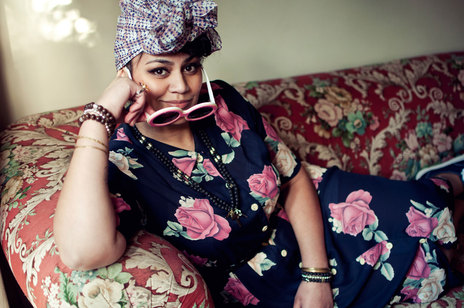
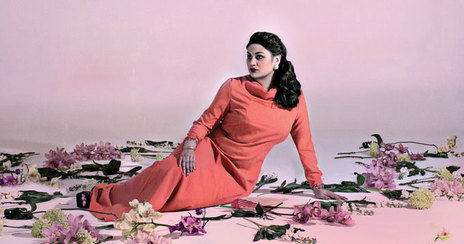
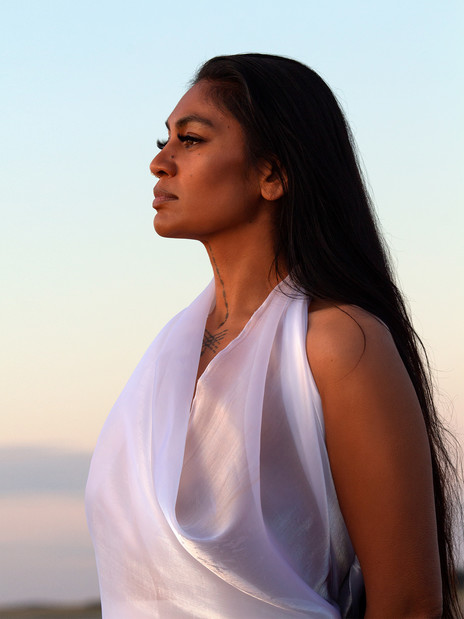
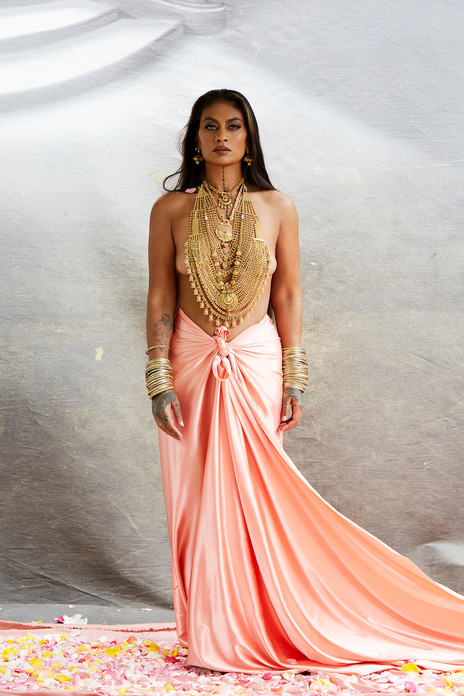
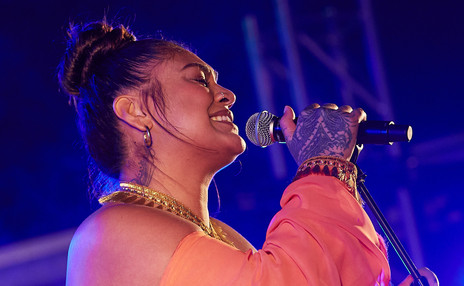
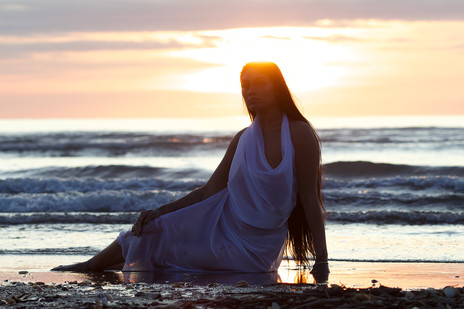
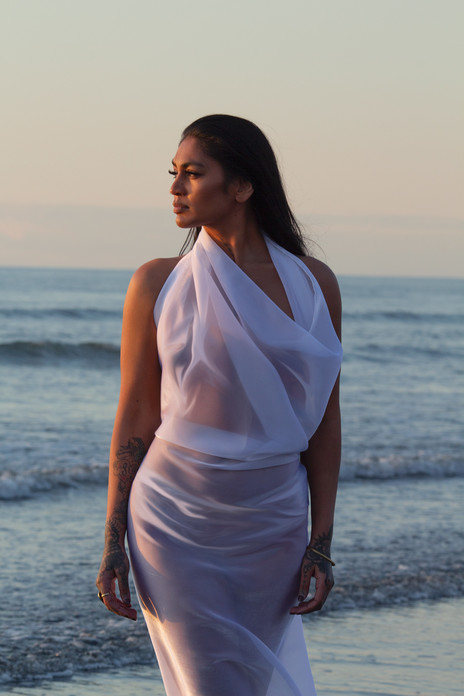
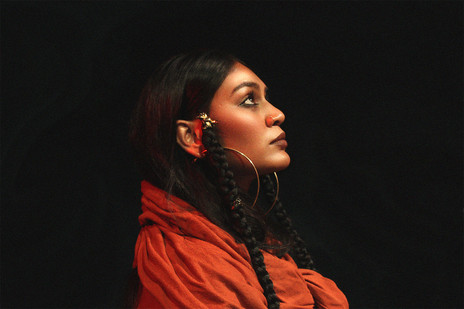
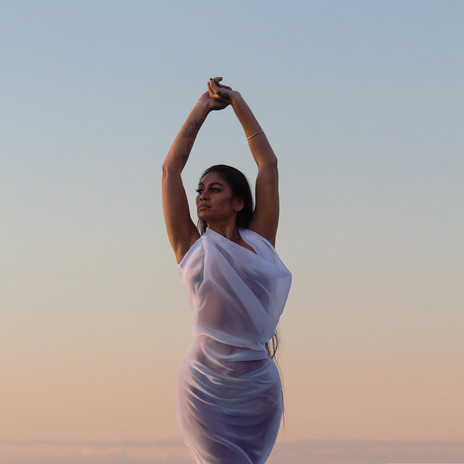
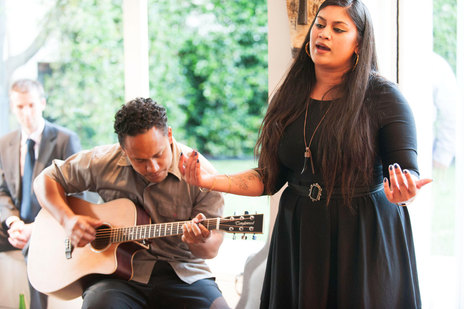
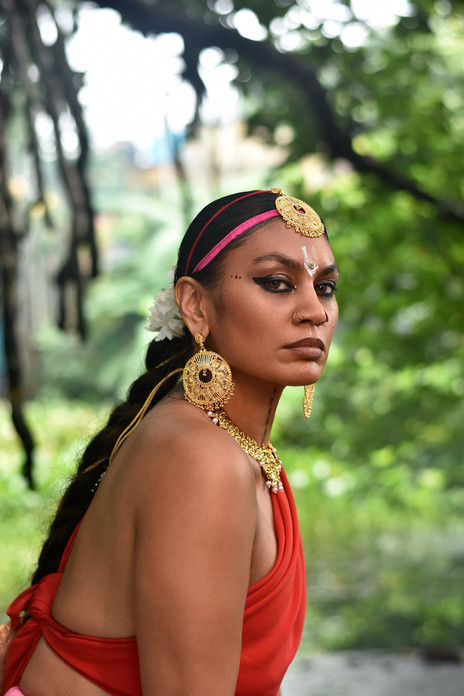
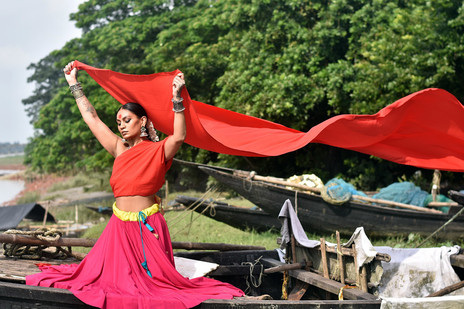
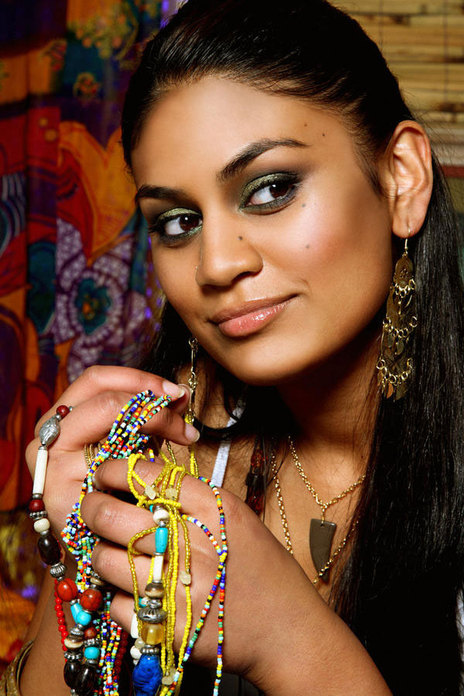
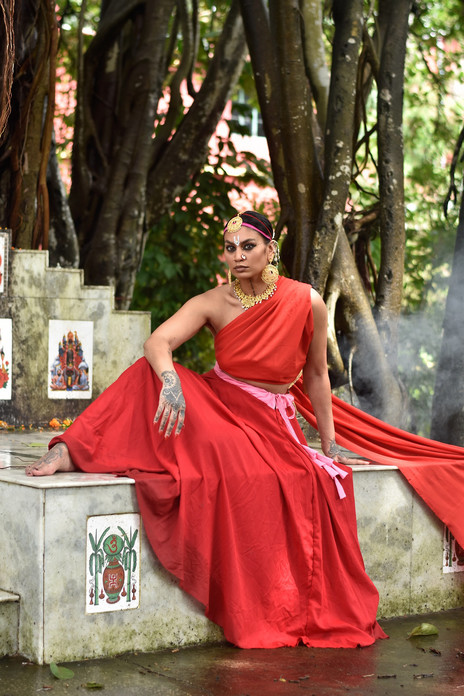
RNZ interview about Aaradhna's 2024 album Sweet Surrender
Aaradhna, Annie Crummer, Bella Kalolo, Esther Stephens, sing 'Respect', 2017
In late 2007 and early 2008, Aaradhna lived in Los Angeles, where she was recording for Tongan professional American football player Ma'ake Kemoeatu's record label MK Entertainment.
Aaradhna can beatbox. She also creates the demo versions of her songs in her home studio.
Aaradhna 's Wake Up single peaked at No.15 on the USA R&B/Soul chart on iTunes.
Visit our sister site
NZ On ScreenMade with funding from
NZ On Air














